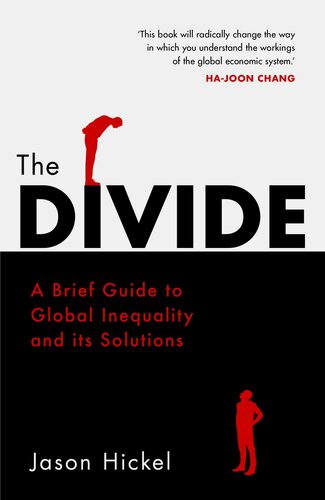
The Divide
Global Inequality from Conquest to Free Markets
کتاب های مرتبط
- اطلاعات
- نقد و بررسی
- دیدگاه کاربران
نقد و بررسی

October 30, 2017
According to this blistering diatribe from Hickel (Democracy As Death), an anthropology professor at the London School of Economics, there is little distinction between the old colonialism and the global aid offered by established economies to the developing world today. He aggressively questions the conventional wisdom that, by offering global aid, developed countries serve as benefactors to developing ones. Rather, argues Hickel, accepting World Bank and the International Monetary Fund loans reduces debtor nations to an indentured servitude comparable to the imperial yoke of old. Hostage to servicing the debt from such loans, nascent economies are hindered from the kinds of domestic investment that would provide a route out of poverty. Hickel’s clear-eyed debunking of the platitudes of international aid is refreshing and revolutionary. Americans and Western Europeans, he charges, have long ignored their countries’ complicity in assassinations of and coups against the leaders of developing nations who suggest defaulting on sovereign debt or nationalizing industry. Hickel also notes that, with the onset of global warming, developed economies are rapidly transforming the Earth into a death trap for rich and poor countries alike. His writing penetratingly explores those forces that perpetuate global inequality and shreds the notion that the fissure between rich and poor is anything other than intentional.

November 15, 2017
A sharply argued analysis of the traditional explanations for wealth and poverty in the world, offering a program for easing misery while addressing structural inequalities.Hickel (Anthropology/London School of Economics; Democracy as Death: The Moral Order of Anti-Liberal Politics in South Africa, 2015, etc.) examines the conventional wisdom that holds that the reasons parts of the world are rich and parts poor have to do with comparative advantage, supply and demand, distribution of labor and capital, and market conditions, with the rich ones having "the right institutions and the right economic policies" and the poor ones being alms-begging basket cases because of some supposed natural order of things. While global inequality mirrors the inequality of wealth within economies, the gap is widening ever more rapidly between rich and poor countries, such that the gulf between per capita incomes in the global North and the global South "has roughly tripled in size since 1960." Even the beginning of that era wasn't as bad as the 1980s, a period that the Millennium Development Goals program of the United Nations overlooks, training all development specialists "to forget everything that happened before 1990." Hickel, though, isn't inclined to forget, and one of the things to which he ascribes at least some measure of Western wealth is unpaid labor over hundreds of years in the form of slavery, which added nearly $100 trillion to the coffers of the United States alone. "Why do poor countries have an abundance of labor in the first place?" asks the author, answering himself with the observation that under colonial rule, indigenous economies were overturned in favor of dependent ones even as their resources were carted off to the capitals of Europe and North America. Hickel proposes several remedies, including debt relief, tax rationalization, and putting an end to land grabs, all meant to level the playing field.Sure to distress the neoliberals in the audience but a powerful case for reform in the cause of economic justice.
COPYRIGHT(2017) Kirkus Reviews, ALL RIGHTS RESERVED.

December 1, 2017
Hickel (anthropology, London Sch. of Economics) examines the relationship between rich and poor countries and why such a divide persists. He finds that there has been little progress in alleviating poverty in underdeveloped countries since 1948. The world up to 1500, says the author, was relatively equal until European nations combined imperialism and capitalism to capture and concentrate global wealth. Since 1948, Hickel argues, wealthy nations have maintained their advantages overtly by destroying progressive movements in impoverished lands and more subtly by acting through international agencies to smother emerging economies with debt, inequitable trade rules, unequal treaties, corporate tax evasion, and the worst effects of climate change. Hickel's remedies include reducing debt, making trade fairer, and insuring just wages. However, he warns that efforts to end poverty through economic growth are unsustainable on a finite planet. He instead advocates a strategy of development focused less on material consumption and more on meeting the basic human needs. VERDICT Accessible to all readers, Hickel's revealing and sometimes angry critique will spur deeper thought about the inequities of the global economy. [See Prepub Alert, 8/21/17.]--Lawrence Maxted, Gannon Univ. Lib., Erie, PA
Copyright 2017 Library Journal, LLC Used with permission.

























دیدگاه کاربران